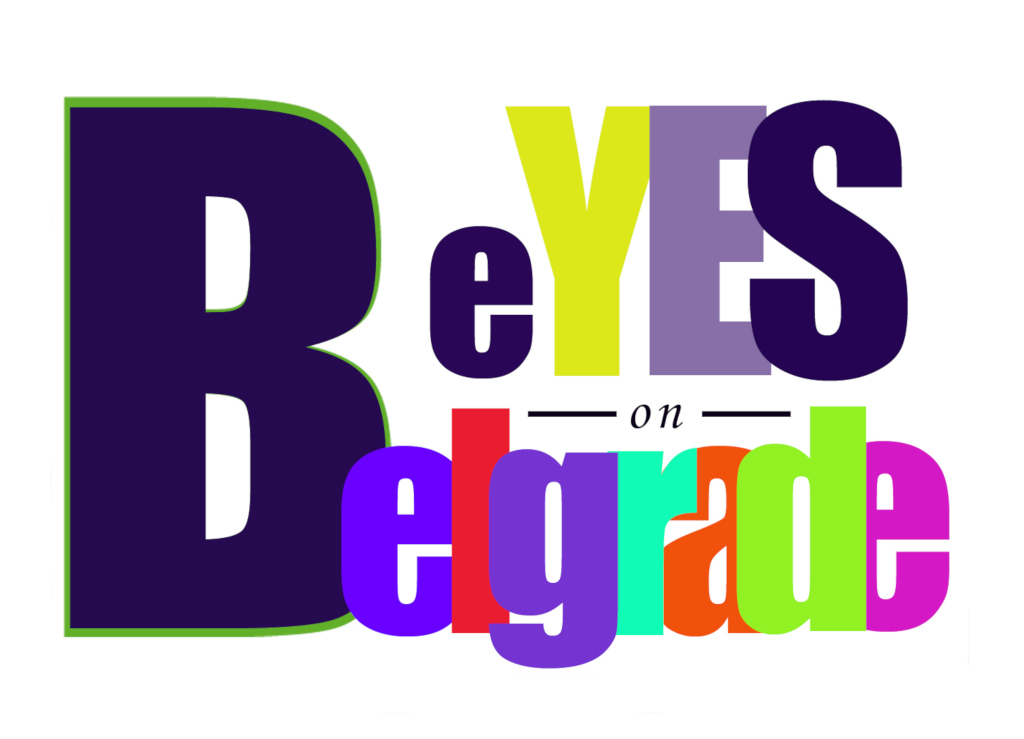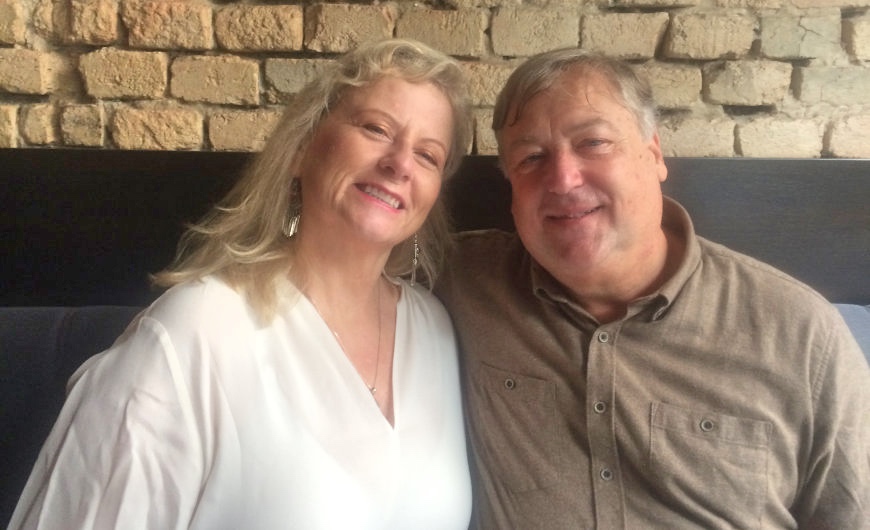We spoke to Shelley and Scott Weier, from Weier Outta Here, a travelling couple who told us many instructive stories from their vast experience, that we really enjoyed.
Shelley Weier worked in lending and mortgage banking for 37 years. She was born and raised in San Diego, California. "I travelled a lot. I worked for Transamerica Financial Corporation for more than 20 years as a branch manager, and during that time we would win incentive trips around the world for doing high performance. It is a Fortune 500 company and I did really well. I had to, I was the only woman, you know. So, I did well, and never missed an incentive trip, I won them all. And they would send us to places all around the world. We got hooked to travelling. And I also travelled a little bit when I was a kid, in high school. I went to Foreign Study League for a month, and we went all over the world. That started it. And then, with all the trips, with our company, we couldn’t live without travelling any more. We love meeting new people and cultures. It changes your perspective. It makes you a smarter and better person. And every time we travelled it was like WOW! It improved us. Belgrade, for example, has affected us, it’s like in my soul now. I really think that I am Serbian. I want to do a DNA test. I seriously think that. We keep saying that we are Serbian! Because we feel so at home. It just hit us so hard. The people have been unbelievably kind and welcoming to us. Belgrade and Serbia are in our hearts and we are seriously thinking about living here," Shelley said enthusiastically.
"We talked about wanting to live in a different country pretty much our whole lives. We kept thinking, when we retire we want to go here, or there. We were getting fed up with our jobs and how crazy the US is becoming. The division between Americans is simply disheartening. And it is just work, work, work and never enjoy your life. And we said we can’t do this. We’re gonna die so soon and not be very happy. And people aren’t happy, they are living on a hair trigger in the US. People snap at each other and they’re just not nice. That’s why it's been such a breath of fresh air to travel and visit places like this. There are some places we absolutely love. When we hit here, we said, you know, it is so much of what we like in a country and in a city, all in one place. If we made a list of everything, Belgrade fits to a tee, more than any other place we’ve been in the world. And we travelled a lot! So, it’s a feeling, it’s not just the beauty. Obviously, it’s gorgeous, the architecture is surprisingly stunning. I cannot stop looking at it all the time. But, it’s the convenience, it’s the cafe lifestyle, it’s how you feel just walking on the street and everybody walking around with big fat smiles all the time. Just the sweetest things you see in Belgrade. I watch people interacting, looking from our window, in our apartment, and I'm calling Scott, telling him that people in America don’t walk like this. Look how they’re talking to each other, I say to him, they don’t have their phones out, they’re actually enjoying each other's company. And it’s just beautiful. It’s something that we see, as a strangers, and you don’t, because that's how you guys are," Shelley explained.
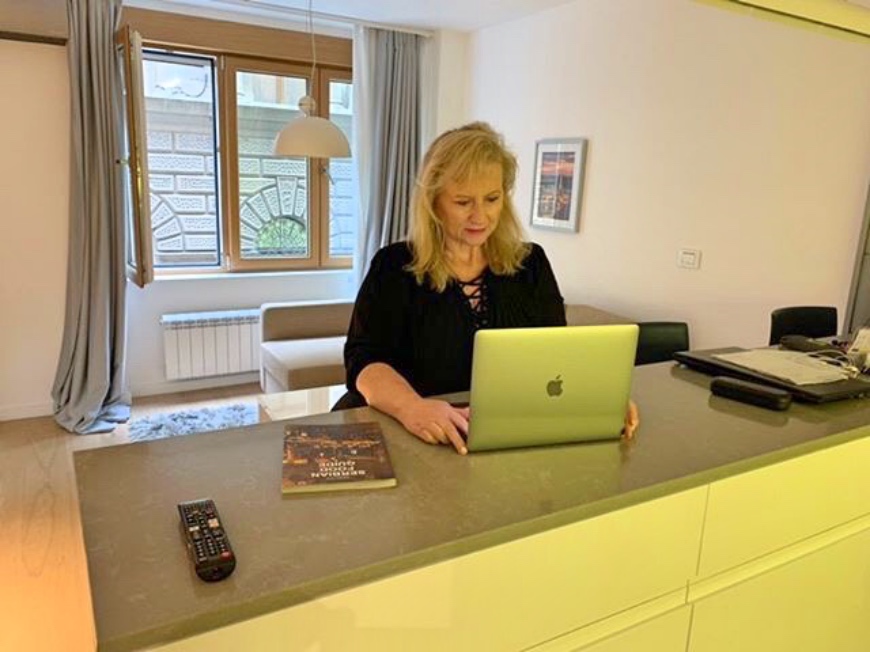
Scott Weier is from San Diego, California, where he has lived and worked for the last 40 years. He grew up in Detroit, Michigan, known for automobiles. He was educated there, and moved to California at the age of 22. "I’ve travelled a lot. I worked in finance, both mortgage lending and real estate, along with my wife. Prior to that I worked in computers. So, we think, we are not brilliant, but we are probably smarter than a lot of people. Because we left."
"We are geniuses!" Shelley intervenes eagerly. "Because of everything that is happening in the US right now, we keep calling ourselves geniuses," she adds. "We are showing pictures to our friends of what we are doing, and they hate us. Ok, not really, but they laugh. They think it’s funny."
Shelley and Scott are so charming. They know each other to the bone, and they are jumping ahead of one another to finish the sentence and add a final touch to the thoughts they, almost exclusively, share in common. Shelley stands out in that sense. She has an adorable smile. "I cannot guarantee that I wouldn't jump in again", she says on his remark to let him finish the introduction. But he is holding up well.
"We worked long weeks and long days, trying to live 'the American dream'. And it’s a financial idea that you can accomplish anything in the United States. They export that idea around the world, that if you can somehow get to America, you can get a lot of money, you’ll be happy and everything will be ok", says Scott. "You, basically, sell yourself to the devil for that," Shelley adds.
"In truth," Scott explains, "we do see that the United States does offer maybe more opportunities than a lot of other countries. It is true to some degree that if you have a good idea and you are willing to work hard for it, then you can probably do well and elevate your position in life. If your goal in life is only to make money, then it is absolutely true. If your position is to have better, quality life, that may not be as true. You spend all your time working to pay for the high expense, and it is very expensive to live in the US. Things cost generally more than they do most places around the world. There are some exceptions. There are very expensive places like England, Northern Europe, Switzerland, some places in Asia, like Singapore or Japan. Those are places that are actually as expensive or more expensive than the United States. However, if you get off of the coasts, in the States, if you are inland, it is much more affordable. Probably, the more enjoyable lifestyle for most people would be on the coasts. That’s where the big cities are, there is more to do, and it’s more cosmopolitan."

"So, we worked hard, we worked long, and the harder and longer we worked, prices kept going up. We would literally wake up in the morning and go 'oh, God, another day!' It was dreadful. Terrible. We were so unhappy. And we almost cried that we got to change it! It was ridiculous. I mean, no one could live like this. We were miserable."
It seems that Shelley and Scott understand perfectly the differences between various lifestyles, connected to the places and cultures that are shaping your way of thinking, and ultimately you, as a person.
"We did make a lot of money and we lived in great places, two blocks from the beach. Most people would not feel so sorry for us," Shelley says honestly, with a big smile on her face. "But when you see those people, driving convertibles, they are not happy like you think they are," Scott is immediately throwing a new light on this general presumption.
Shelley says that she is optimistic by nature. She will always find something to make her happy, she will dig out happiness somewhere. And you can see it on her face. She keeps smiling and not taking things so seriously as Scott does, apparently. She was completely relaxed, she enjoyed herself, while Scott was thorough in his explanations, trying to be as informative as possible. And she was jumping in every so often with precious commentaries. It was a perfect mixture of pleasant chatting, with funny remarks, and a serious conversation, from the vast knowledge and experience they have.
It is hard to imagine that they could get upset. They are such a nice and friendly couple, and we were really blessed to have an opportunity to converse with them. "That's me," Shelly said, "I will always find good wherever I’m at."
"No matter how much we accomplished professionally, or how much material stuff, nicer cars, place near the beach, gadgets, big screen tv’s, no matter how much of that we were able to afford for ourselves, none of that, at the end of the day, made us happy. We didn’t wake up with a smile on our face, saying 'let’s go, another great day'. We were saying 'is this all there is to life?' It was depressing, really," Scott sighed.
"The happiness was going in shopping and buying those things, but once you had ‘em it was like ok, that buzz is over, I need a new one," Shelley explained.
"Here is the funny thing about consumerism in America," Scott was about to relate an interesting story. "It’s all about identifying something you want, whether that’s like a new car or a new 80 inch flat screen tv or laptop, or a new home, whatever. You set your goal on getting that thing, you research it, you find out all about it, you shop, you get a little buzz, because it‘s exciting. And then you finally get that thing and you’re happy. And you show it to all your friends and family, like 'look at me, I’m something now, I'm a big deal'. As soon as you show it to your friends, they are not happy for you, they resent you for it. That’s sad, really."
Shelley nodded. "It’s like sickness in America. We got caught up in it. But at least we realized that's the wrong way to go," she admitted. Scott agreed. "There is no happiness at the end of that road," he said. "It lasts for a couple of weeks, and then you need something to replace it. In the US they call it 'shopping therapy'. That never ends. It’s a vicious cycle. You end up with all that stuff, but you feel really sad and empty inside. And like, what’s the point?!"
Then, Scott summed it up. "You have ever increasing bills to pay and you just have to work harder and harder. All of this is what led us to say 'screw it, we’ve done enough here, let’s sell everything, cash it out, let’s get liquid, and let’s hit the road!'”
That was back in May, 2019. Since then, they visited, or rather lived in 15 countries, from Mexico to Vietnam.
Shelley smirked. "There is a better life out there, people with smiles on their faces, people that are living. Every time we travelled we were like 'that’s our happy place!' It’s going and meeting new people, learning about cultures and history we didn’t know about. We had to get back to that," she explained.
"Some places, for us, are much more livable than others, but we are able to find something enjoyable about every single place we’ve been," Scott explicated. And Shelley jumped in. "Even the bad ones!" She shouted. He nodded and moved on to explain it further. "And the thing that we totally realized is the people like you and I talking have so much in common, we think alike, and the only people that are screwing up this world are politicians and governments."
Shelley smiled. "Oh, don't start with politics!" She tried to wave the topic off. But, the truth is, Scott was only saying what we all think. And he felt like he needed to make a point. "We completely separate the idea or people on the street, the people we meet, no matter what their government is doing, we know that they probably don’t agree with it or have no control over it." Then he stopped for a little while and reflected, before he resumed his monologue. "We understand that Americans have either a good reputation or really horrible reputation," he admitted. And Shelley couldn't agree more. "They are losing their reputation, any good we had it’s in the toilet", she confirmed. "But if you were to go there, and meet people," they both said at the same time, "you would find a lot to like, you would love them."
"So," Scott said, wrapping it up, "we judge place on, really, not so much what it looks like."
"You never know until you are on the ground, no matter how many articles you read, books, Wikipedia things, or YouTube videos you watch, you never know," Shelley firmly stated.
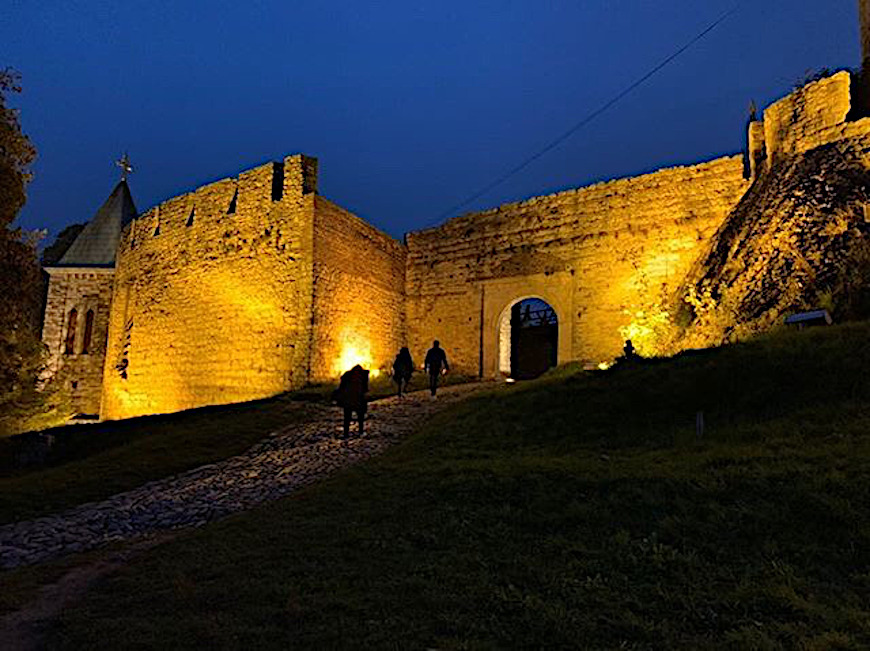
Slowly, we started to talk about Belgrade.
"Taxi dropped us off at Republic Square. we started rolling our suitcases, and I felt immediately that the city embraced me," she expressed, arms wide open. "And I thought, we are gonna be ok here. Within minutes."
Scott explained. "We thought we were going to be here for a week, and by the end of the first day we knew that we would try to stay longer if we were to find a good place to stay. And we did." Shelly immediately jumped in. "Our hosts are unbelievably kind!"
When it comes to traveling, everybody knows, there is always an issue with visas or a limited time that you are allowed to stay in the country. "We are allowed to stay 90 days on our passport, and we stayed for the full three months," Scott explained. "We would stay longer," he added.
We started asking them our usual questions. First, we wanted to know if they knew something about Belgrade before they came here.
"Well, yes, a little," Scott replied. "As kids in school we learned about European history. We understand Belgrade has an ancient history. We understand that in the Balkans the assassination of Ferdinand triggered the World War I. We understand the Habsburg Empire’s influence in the Balkan region. We understand World War II and the part that this region played in this war. These are things that we are taught in school, in the United States, usually around junior high - early high school."
The general assumption around here is that Americans do very poorly when it comes to world history, and that they are pretty much focused on themselves. Scott either proved it to be worng, or he is just an exception. We were, certainly, amazed with all the stuff he picked up from school.
"We’ve become more aware of it in the 'Cold War', and we understand Tito’s influence. We remember Yugo automobile, which was shipped in the United States. So, we had some knowledge, like general knowledge. When we become more aware of this area was during the wars in the 1990’s. But before we arrived here, we didn’t know much about Belgrade specifically, as a city," Scott explained.
And then they confirmed, in a way, our prevous assumption.
"In the United States," Scott admitted, "the cities you see on TV all the time, in Europe, would be like Paris and Rome. Eastern European places don’t get a lot of love. You cannot see any travel shows on Belgrade or Serbia." And Shelley confirmed it. "I don't remember I have ever seen a travel show on Belgrade and Serbia on our TV."
As for YouTube videos on Belgrade, Shelley and Scot think that they are not so good. Scott feels that you can get a rough idea about the city by browsing them. "We have seen enough clips that we could say ok, this might be interesting,” he affirmed. "We’ve noticed, though, many young people from Serbia, in their 20’s, on YouTube, thinking that they are going to be stars, doing all kinds of self-promoting videos," they added unanimously. "It’s like, get over yourself!" Shelley laughed.
"The bottom line is," Scott explained, "what we saw about Belgrade before we got here did not even show the city as it is. We are super excited to start sharing our own material. The people here are so sweet and kind." One can see that Scott and Shelley are really overwhelmed with emotions when speaking about Belgrade. "The current videos you can find on the internet do not portray the essence of this city," he concluded.
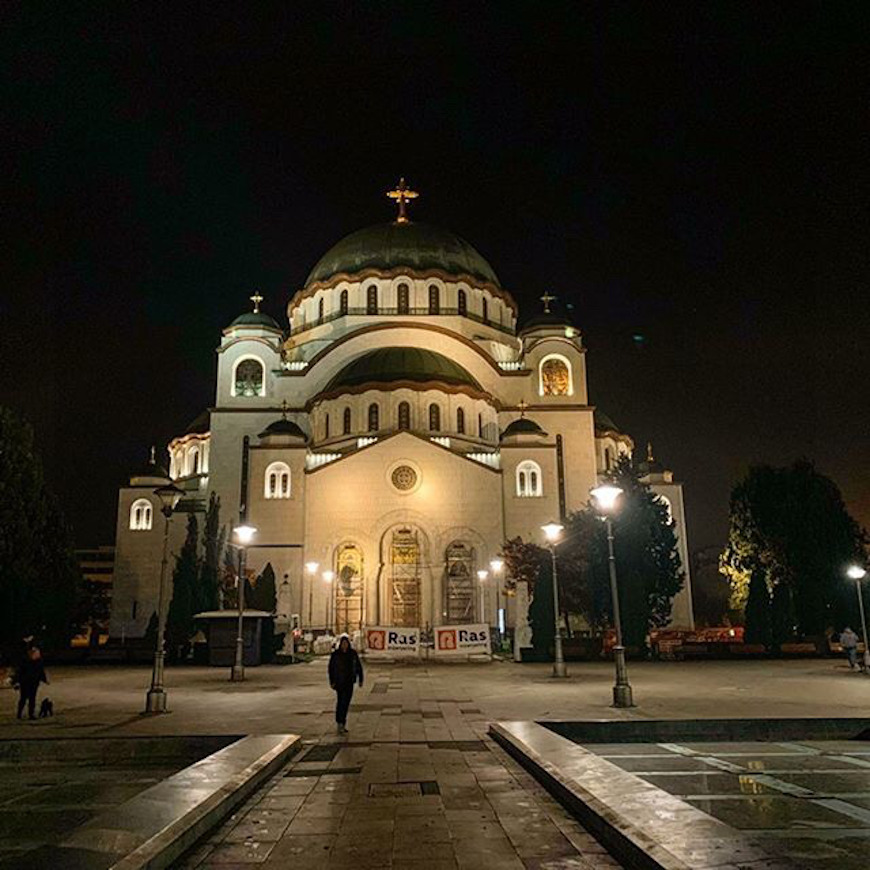
We asked them about their expectations from Belgrade.
"I expected to find, from everything we have seen on TV as kids, an Eastern European city that is poorer and disrepaired," Scot said. "Like Detroit," Shelley adds and laughs. "Something like that, yeah," Scott confirmed, "with lots of Soviet era black constructions."
Well, on one side of the city, that's not far from the truth.
"We saw a lot of that in New Belgrade, though, and we loved it," Scott clarified, as if he could read our thoughts. "But we did not expect this neoclassical architectural center, which is so stunning, and the pedestrian street, and the fortress, and the confluence of two rivers. It's a visually stunning city!" He could not hide his admiration. "We expected it to be a more communist area, where things were built for purpose and not necessarily for aesthetics."
Shelley felt an urge to make an even more powerful statement. "The fact that you guys have had it destroyed and rebuilt 40 times, or way more, it really says something about the Serbian people. It’s mind blowing. We have cities in the US, like Detroit, which I mentioned earlier, that was bombed out in the 60’s and it’s still a horrible place. You don’t go there at night. And here, It’s so safe everywhere."
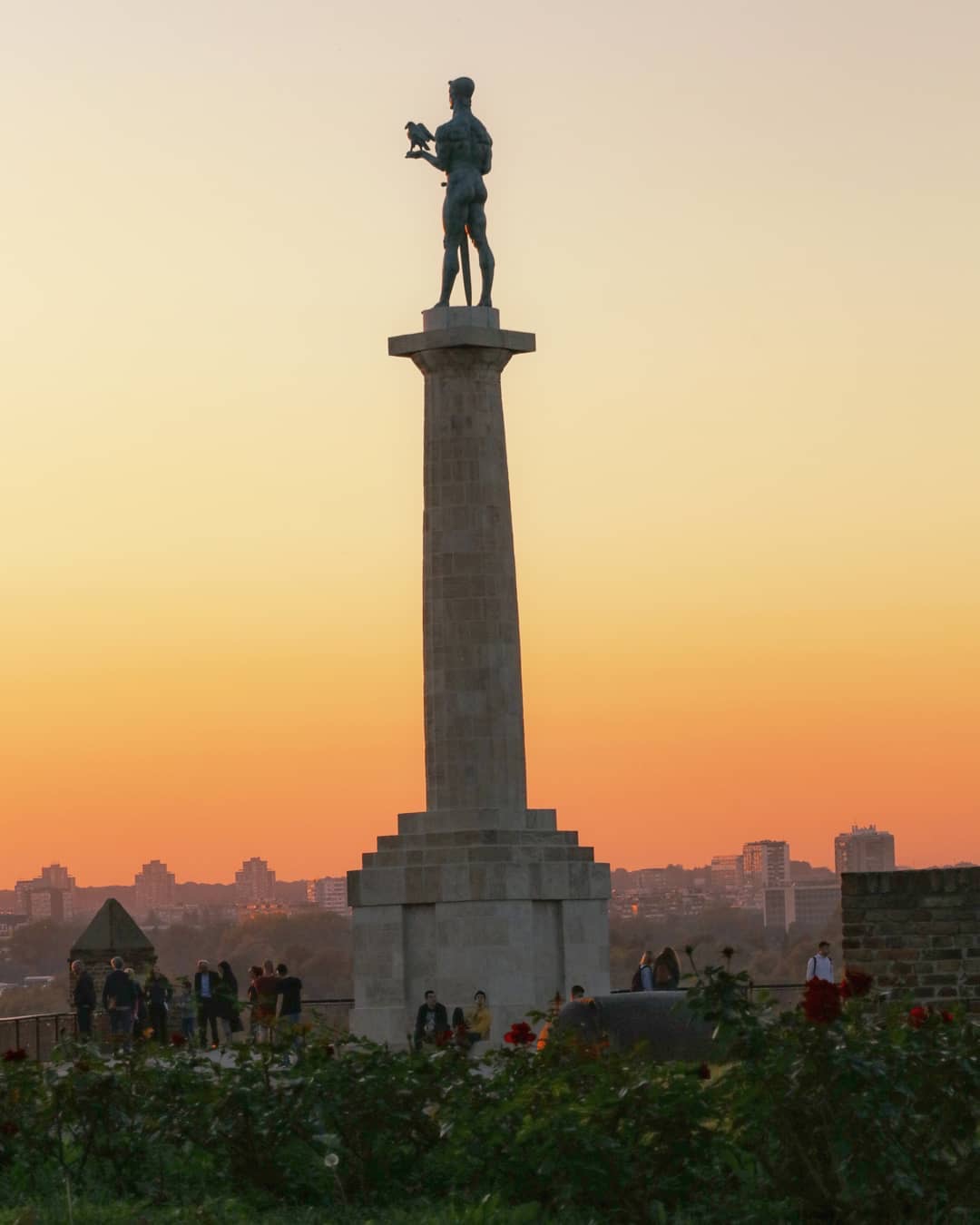
Scott gave us an explanation. "The thing is, everybody thinks the US is rich, but the United States is simply a dichotomy, a land of halfs. There is a lot of poverty, and the middle class is getting smaller and smaller, gravitating towards poverty. And the country is polarized."
We were interested in what was the first thing they noticed in Belgrade.
"Apart from Genex tower, obviously, which you see on the way from the airport, it was a beehive of activity at Republic Square," Scott replied. "Families out, children out, people in the cafes. We arrived very late in the day, it was like 6pm, late August, and people were on the street, enjoying themselves. It felt so very European, civilized. We felt such calmness, on the other hand. There’s such a calmness about this city. Even though it was busy, it doesn’t feel frenetic, like Paris does. It’s vibrant."
That's their word, describing Belgrade. Vibrant.
"I got one thing that I dislike about Belgrade, though," said Scott. "I would like to see more sweet stuff in the bakeries." We all started to laugh. "You guys, got wonderful bakeries, but coming from the US, and also Western Europe, the French have poisoned us for sweet pastries, and you don’t have as much of those stuff here. You have a lot of meat and cheese products, but I am not coming to the bakery for a ham sandwich." Once again, everybody bursted into laughter. "But, really, that’s a minor complaint," Scott comforted us.
We asked them to compare Belgrade and San Diego. What a difficult task! But Scott and Shelly did it like a pros.
"We are coming from San Diego, California, as you know," Scott started the story immediately, "and it is a really beautiful city on the Mexican border. With the population of 2 million, it is the second largest city in California. It’s a modern city, it’s got a huge harbor on the Pacific ocean, it’s home to the US Pacific Naval Fleet, it’s a busy place with lots of wide freeways, tall glass buildings and pretty beaches, palm trees and a lot of suburbs. We love it. There is almost no comparison to a city like Belgrade. Because it's a car culture there, everybody lives spaced in neighborhoods, people live out in the suburbs, in their own houses with yards and fences, so the sense of community is harder to achieve. There is no communal feeling. Everybody’s in cars and on cell phones."
Shelley tried to express it vividly. "So, it’s like I am in my house and I have to go out and run 8 errands and then I am back in my house and I might have some friends over later, like a couple, but we are not out, mingling, walking up and down pedestrian areas, we stay at home. It’s just different. Miles apart."
"In San Diego they do not have those huge green markets that we like to do video on here. They have kind of a small moving fake farmers’ markets, that are overpriced. They get it in your neighbourhood once a week, in the morning. Otherwise, everything is coming from the supermarkets. And the supermarkets are huge."
"And the food is terrible, all genetically modified, no flavor!" Shelley shouts. "The US praise themselves of having very high level of inspection on food products throughout the whole system," Scott explains, "yet on a very regular basis you get recalls on TV that if you bought this pork product, for example, return it, because it’s got Salmonella or Botulism or some sort of bacteria in it because it was mishandled. It happens constantly in the US. At least once or twice a year, we would get food poisoning. It’s crazy. One thinks it shouldn’t happen in the United States."
And if you are surprised, wait for the next passage.
"We have been eating on the street, street food, in Vietnam, for example, crazy places, you do not know what you are eating, and not even once we had stomach problems. And in the US we would have had it several times, for sure," Shelley told us.
"So, to conclude," Scott summing it up once again, "Belgrade and San Diego are so different. But for that reason you should go, and learn the differences, live the difference, enjoy the differences. That’s our way of thinking."
"Right now, we would choose to live here, in Belgrade" they said unanimously.
From Scott and Shelly we learned that the people in America are uptight, even pretentious. "They have chosen to live that kind of material life," Scott said, "that the car you buy or the clothes you wear says a lot about you. It’s not true, and it’s not really their fault. In America you get indoctrinated from the news, that everything in America is the best, it’s better than any other place on the planet, there is no country better than this, you cannot do any better than this."
"It’s a big fat lie," says Shelley, "you can. You can exceed that type of lifestyle by living elsewhere. The truth is, you can have a much better quality of life and be happy elsewhere." Scott interrupts her. "But if what’s important to you is just making the most possible amount of money at whatever the cost, then go to the United States. You will probably do better there than anywhere else. But if your goal is to have a more fulfilling and more balanced life, to have time to do something else that is important to you personally, then there are way better places than the US for that," he concluded.
Shelley and Scot are delighted with the people of Belgrade and they say that they could absolutely live here. "We talked about this, more than once," Shelley affirmed.

Often, we ask people to name one city, anywhere in the world, that resembles to Belgrade. Their answer was quite surprising.
"When we say that Belgrade reminds us of Paris, people don’t understand," Scott said. "It’s the neoclassical architecture, street cafes, the appreciation of good food, these are similarities. There is no Eiffel Tower here, of course, but neither is there a Fortress in Paris." We looked at each other. The man is right.
The other city that is very similar, in their opinion, is Valencia, Spain. "Valencia has a highly pedestrianized center of the old town, with lots of outdoor dining, and lots of people smoking, if I may add. Spain is kind of the same. They are often out with their families, walking around. It’s the outdoor, late night style of life. Valencia is much more similar to Belgrade than Paris, when I think of it. Before we came here, Valencia and Crete were the top two places for us," Scott told us.
They were in Greece for five months, as they got a two months extension, due to the pandemic, from the usual three months that the US passport allows their citizens to stay in the Schengen states. "And when we left Greece, we thought that nobody could be nicer to us then the Greeks. But then we came to Belgrade, and it was unbelievable. The Serbian people are top notch, really," Scott admitted.
Scott and Shelley shared with us an interesting, socially defining story.
"In the US," Shelley said, "usually if there are more than two people at the table in the cafe, they are texting each other. Everybody is holding their phones. And I remember I was delighted to see that people here are actually talking to each other and not looking at their phones. And I thought 'look how people like each other here'. Imagine that." She laughed, and added: "The beauty of the people here has affected me immediately."
In the end, Scott wanted to clarify their observations, in view of their position of both tourists and almost locals in Belgrade. "We have lived here for three months. We went shopping, out for groceries, to green markets, pharmacies, we were buying stuff from vendors on the street. We had to go to the doctor, as well. Shelley accessed the medical system six or seven times. She got a MRA done in one of the hospitals." Shelley picked up the story from here. "Because I had spinal problems, and with my hip. They found out what was wrong with me. I’ve had this looked at so many times in the US, and here they immediately made the diagnosis. The doctor said that he thinks I have some kind of infection and they put me on antibiotics, anti-inflammatory, and by day one my pain went away. That’s never happened in the US. You guys actually treat the problem to solve it rather than applying some extensive and costly procedures. It blew my mind, and I was like 'oh, my God, I’ve been trying to get help for that for so long!'"
"We’ll be checking the dentist soon, Shelley got her hair done," Scott added, and made the point he wanted. "You know, we are living like locals, day to day. So we are not speaking anymore as tourists."
Before we parted ways, we wanted them to say a word or two abot the Serbian food. "We have eaten in many different places and the quality of food is unbelievable, anywhere you eat, it’s better than Paris and other big countries," said Scott. "I would say it’s right up there with Spain," Shelley added. "Spain has an incredible food culture, as does Italy," Scott explained. "They have very high attention to the freshness and the quality of the products. They are very concerned that they’re putting the best thing on the plate. I think you guys will be a foodie destination, because a lot of people just travel for food. And no one knows about Serbia in the US like we do now."
They admitted, though, that they don’t want to see the “Parisisation” of Belgrade. Well, to be honest, we are not sure that we would mind.
"Two things will happen to Serbia, maybe not in our time. If Serbia joins the EU, you’ll probably see price inflation on everything, which won’t be good for the general population, but it will bring in more tourists and more business that way, which could be very good for you. It will probably be a balance, but those will be big changes if that happens," Scott concluded.
After this conversation, we can say that we are definitely richer, in experience, in perspective, and in general knowledge. We are sure that you will be, too.
Follow Shelley and Scott, the "Weier Outta Here", on social networks >> Instagram • Twitter • Facebook
Watch their stunning videos on YouTube!
(all photos courtesy of Shelley and Scott)
 English (United Kingdom)
English (United Kingdom)  Srpski latinica (Srbija)
Srpski latinica (Srbija) 